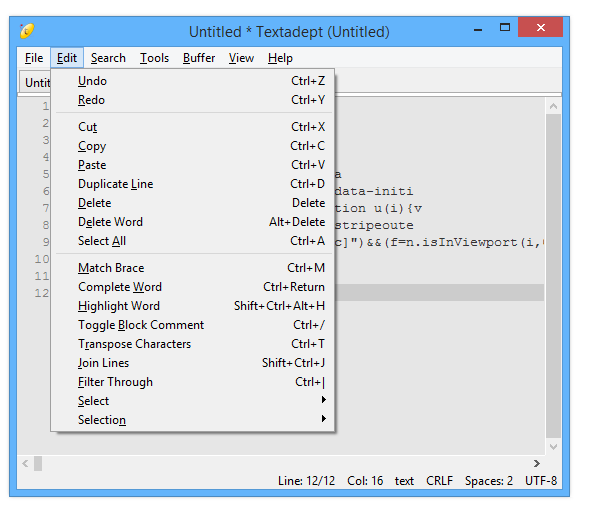

The resource is well suited for educators, too as the name implies, episodes are short and accessible to a general audience. These episodes create more accurate depictions of well-studied events such as the Civil War and school integration, while also highlighting prominent figures left out of most history books (for example, a recent episode discusses Oscar Micheaux, the first Black indie filmmaker). The award-winning show explores important people and events from the past and present.
#Textadept api full
Īs readers continue to celebrate Black History Month, the Black History in Two Minutes (or so) podcast is a wonderful resource to learn the full scope of U.S. Brine Charitable Trust, and The Progress Foundation. In addition to sales and donations, Open Book Publishers receives financial support from the Polonsky Foundation, the Thriplow Charitable Trust, the Jessica E. The site also provides information about the submission process and hosts a blog packed with book reviews and other insights.

Educators may want to pay special attention to the selection of Textbooks and Learning Guides. Readers can browse the latest titles on the home page or sort by categories, including Digital Humanities and Sciences, using the left-hand panel. What makes the literary hub unique is that it not only publishes books in traditional print and ebook formats, but it also publishes "free online editions of every title in PDF, HTML and XML formats that can be read via our website, downloaded, reused or embedded anywhere." This online format also allows for more interactive texts, as authors can embed images, audio, and more. Īt first glance, Open Book Publishers may look like an ordinary bookselling site. Robots Reading Vogue is a joint project at Yale University, headed by Associate Director for Access and Research Services at the Haas Arts Library Lindsay King and Director of the Digital Humanities Lab Peter Leonard. The interactive charts allow readers to compare the advertising highpoints for companies like Estee Lauder, Tiffany & Co., and Calvin Klein. Another project, Advertisements in Vogue, looks at the frequency of ads per issue and plots the data on a graph. Several experiments are showcased on the website, including the Diana Vreeland Memo Generator, a project that pulls the text of over 200 memos written by Diana Vreeland (former editor-in-chief of American Vogue) to create Vreeland-esque memos on the fly. Vogue creates a DH bonanza, as it has been "continuously published for over a century," and is "completely digitized," resulting in some six terabytes of data and thousands of covers and images. Robots Reading Vogue explores the digital humanities (DH) possibilities presented using data from Vogue magazine. For example, the contributors note that "while the archives provide ample information about powerful white men who helped create the university, the information about the lived experience of enslaved people is much harder to find." For more information about the project and its impact, readers may want to explore the relevant news stories catalogued on the About page. The project also acknowledges gaps in research. Users can also explore the research by topic ("slave ownership," "finances," "medical school," and "campus"). Readers can explore the students' reports by semester (Fall 2017-Spring 2019) on the Student Reports page. The message of accountability is not limited to their campus, either the project emphasizes "that no colony, state, or well-funded university was buffered from slavery's reach." The project is powered by undergraduate student researchers and designers, with support from faculty and fellows. In doing so, the project hopes to correct false narratives about Penn's history and create increased accountability and change. Founded in 2017, the Penn and Slavery Project researches the University of Pennsylvania's ties to slavery and scientific racism.


 0 kommentar(er)
0 kommentar(er)
